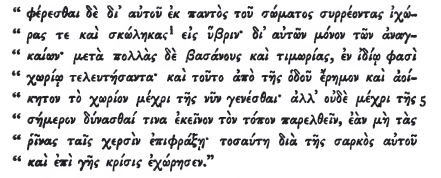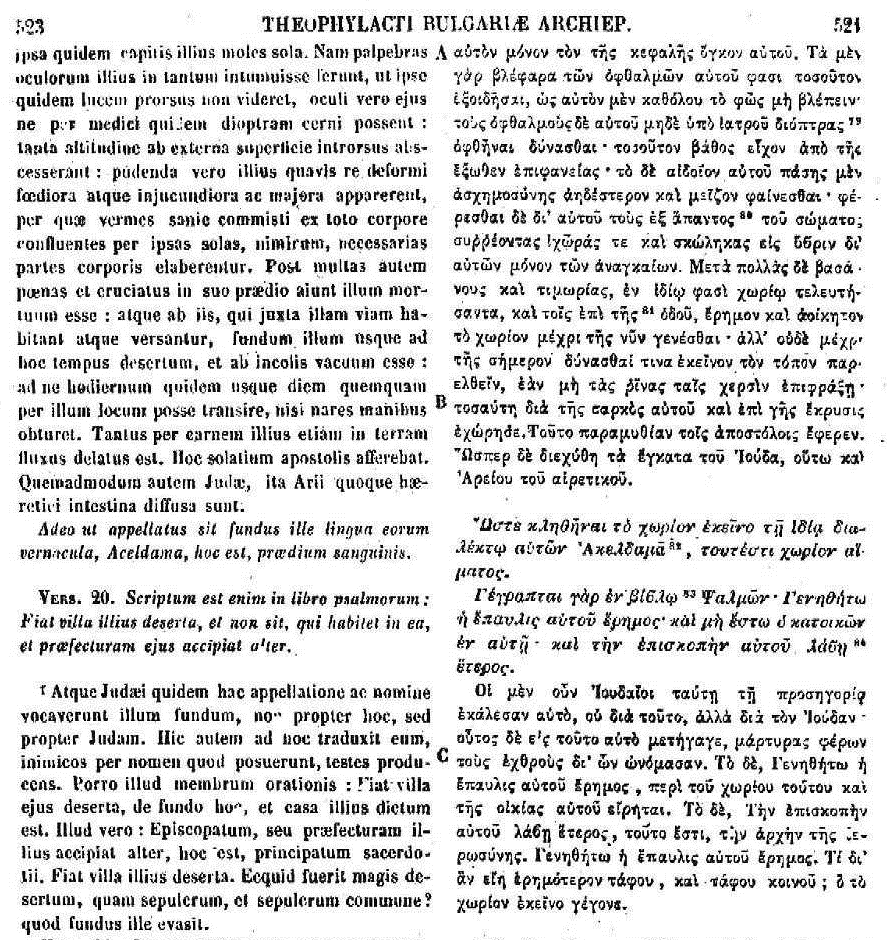
 |
Freethought & Rationalism ArchiveThe archives are read only. |
|
|
#1 | |
|
Regular Member
Join Date: Jan 2008
Location: Myjava, Slovakia
Posts: 384
|
Following quote of Papias is in circulation:
Quote:
This site adds it was in "fourth book" of Œcumenius. Lightfoot and Harmer say: Preserved in Cramer’s Catena ad Acta SS. Apost. [1838] That's as far as I got. Does somebody know a more specific reference, or better, full text of ancient document this quote is taken from? |
|
|
|
|
|
#2 |
|
Veteran Member
Join Date: Apr 2002
Location: N/A
Posts: 4,370
|
I think you have to do with more than one quotation here.
Cramer's catena in 8 volumes is on Archive.org. Unfortunately when I do a search it crashes at the moment, or I would give a link. The volume is entirely in Greek, tho. It is a pity the reference does not give a page number -- most unusual. But presumably we would work it out from the biblical reference in Acts (which is what?). Oecumenius was the author of a commentary on Revelation, the first such Greek commentary to reach us in a complete form. It is not quite certain who he was, nor when he lived. Dates between the 6th and 10th centuries AD have been proposed. However Oecumenius comments at one point that more than 500 years have passed since the exile of John to Patmos, and in two others he quotes the Chronicon of Eusebius to place that exile in the reign of Domitian (81-95 AD). This gives us a date in the late 6th century. The commentary is divided into 12 'logoi'. There is an edition: H. C. Hoskier, The complete commentary of Oecumenius on the Apocalypse, now printed for the first time from manuscripts at Messina, Rome, Salonika and Athos, Ann Arbor, 1928. I don't know if that contained a translation. A more modern edition was published by De Groote, Oecumeni commentarius in Apocalypsin, Brepols, 1998. Apparently a rough English translation does exist in unpublished form, made by Clifford H. DuRousseau. I might write to him and see what I can learn about this. All the best, Roger Pearse |
|
|
|
|
#3 | |
|
Regular Member
Join Date: Jan 2008
Location: Myjava, Slovakia
Posts: 384
|
You might be right. I just found this... it seems you already had extracted the reference from Cramer in past: http://www.roger-pearse.com/weblog/?p=2214
I'll have to give a good read to that textexcavation.com article you link. Quote:
|
|
|
|
|
|
#4 |
|
Veteran Member
Join Date: Apr 2002
Location: N/A
Posts: 4,370
|
Here is the material from Apollinaris, quoting Papias, from Cramer's catena:
  It appears on p.12 of volume 3 of the catena, against Acts 1:17 (p.33 of the Google books PDF). The quotation from Lightfoot I think translates the whole passage. I have written to Durousseau about Oecumenius. |
|
|
|
|
#5 | |
|
Veteran Member
Join Date: Apr 2002
Location: N/A
Posts: 4,370
|
Quote:
|
|
|
|
|
|
#6 |
|
Regular Member
Join Date: Jan 2008
Location: Myjava, Slovakia
Posts: 384
|
Unfortunatelly, I can't read Greek (at least not without help of translation sotware, at average speed 3 words per minute). Does the page you posted have any extra info not in your blogpost?
From your article it appears both longer and shorter version come from Apollinarius of Laodicea commentaries. However CCEL and earlychurch.org.uk article agree there is same citation (shorter version) in 4th book of Oecumenius. CCEL says that Theophylact (who is that?) also adds same longer ending "as if it came from Papias". Now, is this some confusion, or two sets of shorter+longer witness of same Papias quote? EDIT: Tom C. Schmidt at his site seems to mention all these sources and some other. However it is not clear if they are based on Apollinarius or independent. I'll notify him about this problem. |
|
|
|
|
#7 |
|
Veteran Member
Join Date: Apr 2002
Location: N/A
Posts: 4,370
|
|
|
|
|
|
#8 |
|
Regular Member
Join Date: Jan 2008
Location: Myjava, Slovakia
Posts: 384
|
Here is reply I got from Tom C. Schmidt on his blog: http://www.chronicon.net/blog/papias...s-of-laodicea/
|
|
|
|
|
#9 |
|
Veteran Member
Join Date: Apr 2002
Location: N/A
Posts: 4,370
|
The reference to Theophylact refers to the Commentary on Acts, which is in the Patrologia Graeca, vol. 125, cols. 521C-523D. Here is the material, which is found against Acts 1:17-20.:
 
|
|
|
|
|
#10 |
|
Regular Member
Join Date: Jan 2008
Location: Myjava, Slovakia
Posts: 384
|
By the way: How come Theophylact is present only in collection of writings from 19th century, and nothing more ancient? Does that mean manuscript Theophylact was still extant in 19th century when that "Patrologia Graeca" was composed, but isn't today? Or is the collection so good there is no need to look into it's original sources? Same question applies to those cantenae.
|
|
|
| Thread Tools | Search this Thread |
|